RESOURCE TYPE
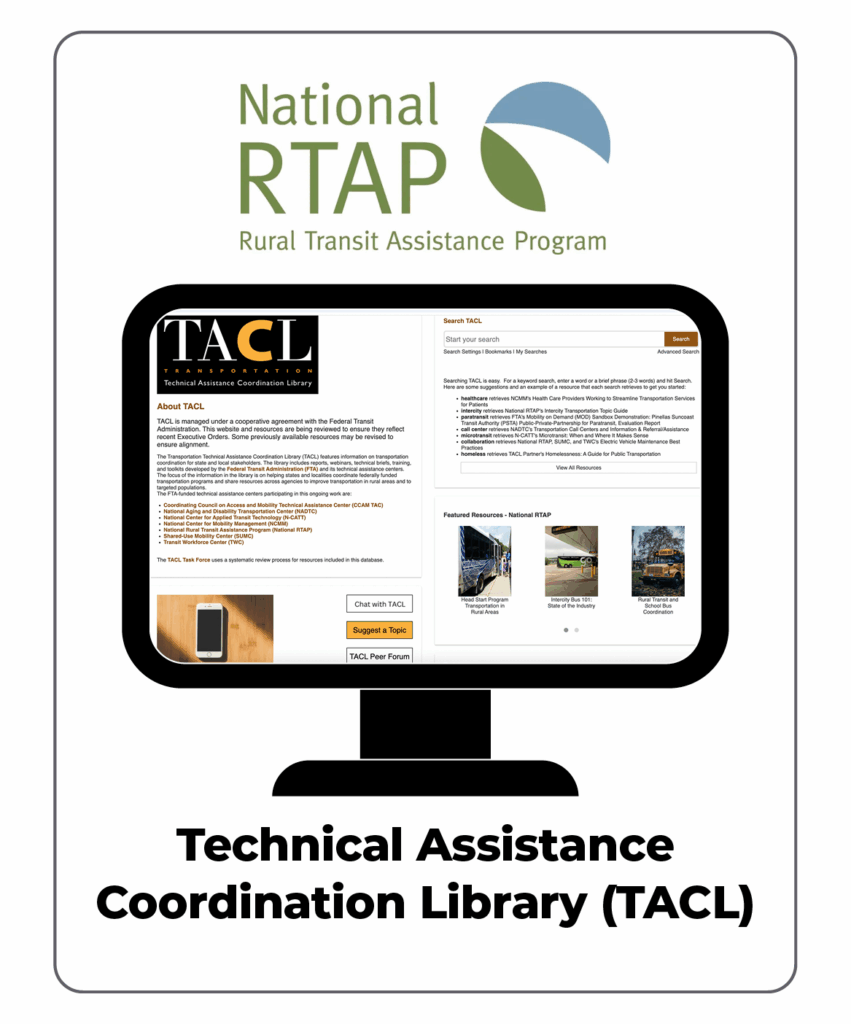
Technical Assistance Coordination Library (TACL)
National Rural Transit Assistance Program
TOPICS: Apprenticeship , Career Pathways , Community Engagement , Hiring and Recruitment , Labor-Management Partnerships , Low-No , Mentorship , Policy and Planning , Procurement , Program Evaluation and ROI , Retention , Safety and Health , Trainer and Mentor Development , Training , Workforce Shortage
Transportation Technical Assistance Coordination Library (TACL)
The Transportation Technical Assistance Coordination Library (TACL) provides a viable methodology and platform for access and findability of rural and tribal transit coordination resources across a broad range of transportation technical assistance centers and the Federal Transit Administration (FTA).
The FTA-funded Technical Assistance (TA) Centers participating in this ongoing work are:
- National Aging and Disability Transportation Center (NADTC)
- National Center for Applied Transit Technology (N-CATT)
- National Center for Mobility Management (NCMM)
- National Rural Transit Assistance Program (National RTAP)
- Shared Use Mobility Center (SUMC)
- Transit Workforce Center (TWC)
The TACL Task Force uses a systematic review process for resources included in the database. New resources will be added on a quarterly basis. Let us know if you would like to serve as a peer reviewer for our resources.
Why was TACL created?
The United States Government Accountability Office (GAO) published Public Transportation: Enhanced Federal Information Sharing on Coordination Could Improve Rural Transit Services in January 2020. GAO recommended that FTA “develop a communication plan that will effectively share information with state and local stakeholders on coordination opportunities in an accessible and informative way.” This effort was created to improve interagency resource coordination between FTA and its five TA Centers.
How can TACL be used?
TACL resources can be used to identify high quality technical assistance on transportation coordination. The resources can be used for research, training, practice, operations, planning, and other purposes. We encourage authors to cite TACL resources.
Ready to get started?
Visit http://transportation-tacl.org. Click on the Training tab at the top for instructions.
If you have a question about TACL, or if you would like to be considered to become a TACL peer reviewer, please contact info@nationalrtap.org
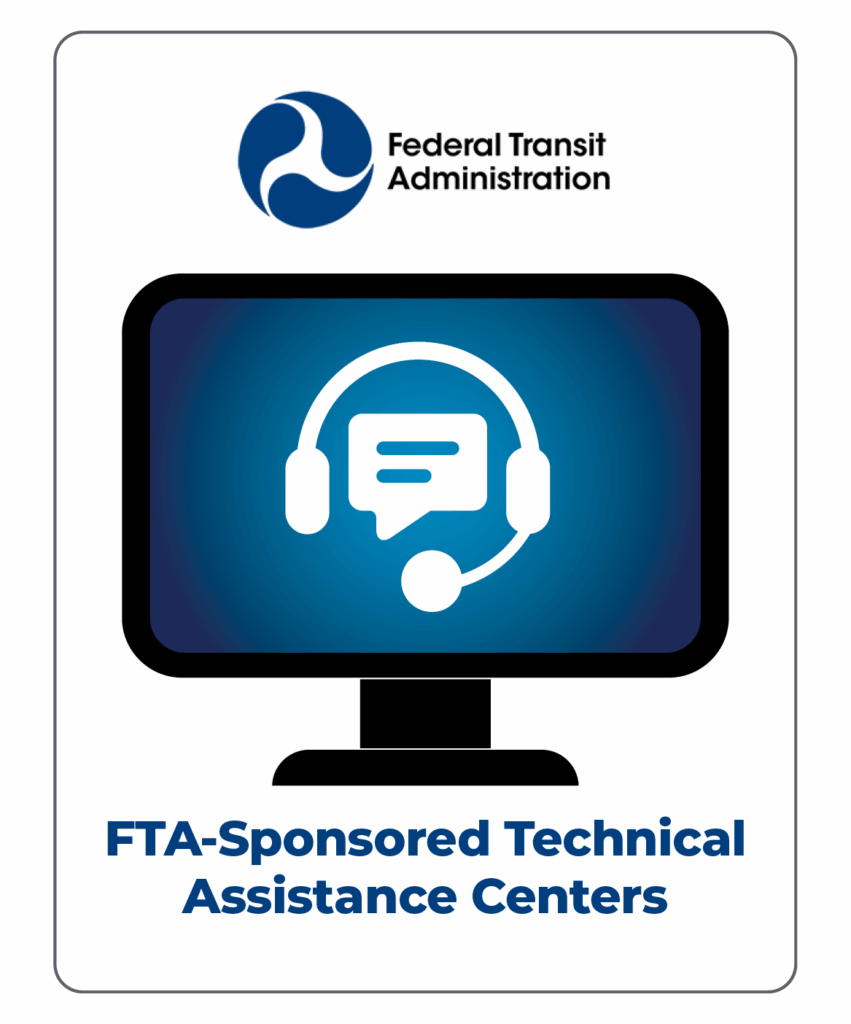
FTA-Sponsored Technical Assistance Centers
Federal Transit Administration
TOPICS: Apprenticeship , Career Pathways , Community Engagement , Hiring and Recruitment , Labor-Management Partnerships , Low-No , Mentorship , Policy and Planning , Procurement , Program Evaluation and ROI , Retention , Safety and Health , Trainer and Mentor Development , Training , Workforce Shortage
FTA’s Technical Assistance and Workforce Development Program (49 U.S.C. § 5314) and the Public Transportation Innovation Program (49 U.S.C. § 5312) fund technical assistance centers through national nonprofit organizations across a number of areas to improve public transportation. These nonprofit partners and the work they do play a critical role in supporting public transit agencies. Their services help to:
- Improve transportation for older adults and people with disabilities
- Drive the adoption of mobility management and related promising practices
- Accelerate innovative mobility practices and strategies
- Support rural communities
- Leverage new transit technologies
- Train the public transit workforce
- Provide workforce development technical assistance
- Support research projects chosen by the transit industry that address day to day issues
- Support the transit industry meet safety regulations
National Center for Applied Transit Technology (N-CATT)
The National Center for Applied Transit Technology (N-CATT) delivers expert, focused technical assistance to transit agencies and organizations in rural areas and small cities to use or develop transit technologies and innovations that make services more cost-effective and efficient. N-CATT’s work supports FTA’s mission and focus on innovation by developing and supporting transit programs and services in rural and small-city America.
National Aging and Disability Transportation Center (NADTC)
The National Aging and Disability Transportation Center (NADTC) is a national technical assistance center funded by FTA with guidance from the U.S. Department of Health and Human Services’ Administration for Community Living to promote the availability of transportation options that serve the needs of people with disabilities, seniors and caregivers with a focus on the Section 5310 program and other transit investments. NADTC supports the delivery of more effective, efficient, high-quality and coordinated specialized transportation services that maximize federal investments. NADTC provides technical assistance, information and referral; develops field training; implements interactive communication and outreach strategies; and supports communities in assessing their needs and developing innovative transportation solutions.
National Rural Transit Assistance Program (National RTAP)
The National Rural Transportation Assistance Program (RTAP) was established by FTA in 1987 to provide a wide range of professional services and products. National RTAP addresses the training and technical assistance needs of rural and tribal transit programs across the nation and supports state RTAP programs. National RTAP provides comprehensive free technical assistance programs and resources including training materials, webinars, newsletters and technical briefs, peer resources, research, and innovative technology initiatives. The National RTAP also manages the Transportation Technical Assistance Coordination Library (TACL), which provides a sustainable methodology and platform to access resources across a diverse range of transportation technical assistance centers and FTA.
Shared-Use Mobility Center (SUMC)
The Shared-Use Mobility Center is a public-interest organization dedicated to achieving equitable, affordable, and environmentally sound mobility across the US through the efficient sharing of transportation assets. By connecting the public and private sectors, piloting programs, conducting new research, and providing policy and technical expertise to cities and regions, SUMC seeks to extend the benefits of shared mobility for all. The Shared Mobility 2030 Action agenda includes improving access to public transit, on-demand shuttles or buses, ride-on-demand services, carpooling and vanpooling, and carsharing, bikesharing and scooter-sharing.
Coordinating Council on Access and Mobility (CCAM)
The strategic goal of CCAM, operated but the Community Transportation Association of America, is to support federal agencies, their grantees, partners, and stakeholders in improving transportation access for people with disabilities, older adults, and individuals of low income. CCAM promotes and facilitates human services transportation, public transit, and non-emergency medical transportation (NEMT) coordination that advances people’s access to everyday destinations.
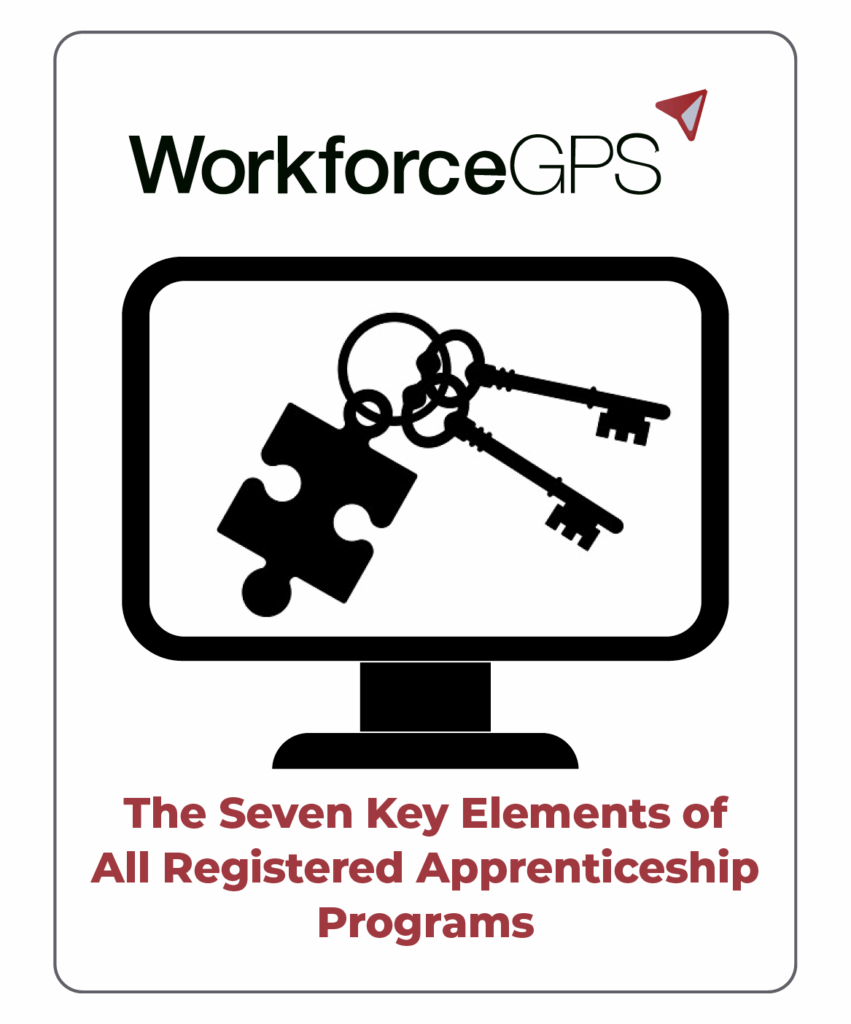
The Seven Key Elements of All Registered Apprenticeship Programs
Workforce GPS
January 2025
TOPICS: Apprenticeship , Career Pathways , Trainer and Mentor Development , Training
Registered Apprenticeship is an industry-driven pathway to high-quality careers where employers can develop and prepare their future workforce, and individuals can obtain paid work experience; progressive wage increases; classroom instruction; and a portable, nationally recognized credential. The U.S. Department of Labor recently updated the way we describe Registered Apprenticeship Programs to reflect the worker safety elements embedded in those programs.
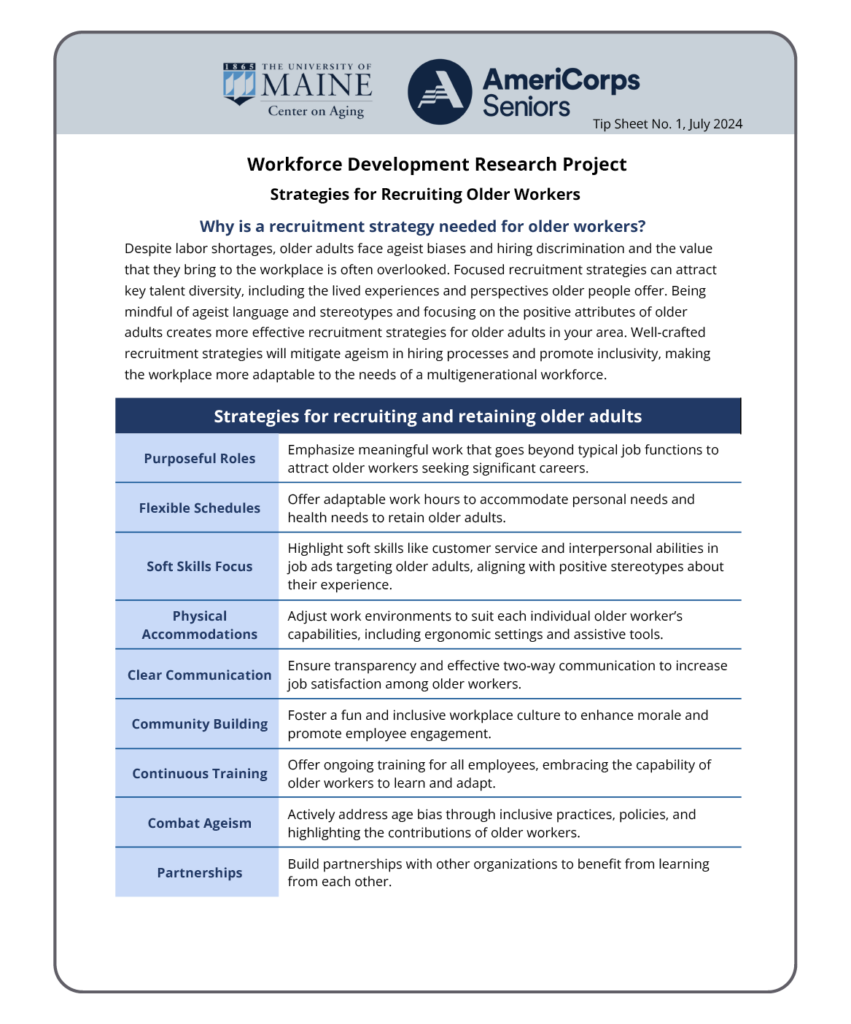
5 Tip Sheets for Working with Older Adults
UMaine Center on Aging & AmeriCorps Seniors
July 2024
TOPICS: Community Engagement , Retention , Workforce Shortage
Given current workforce shortages, reaching out and engaging older workers is of interest to many employers. The AmeriCorps Seniors research team developed five older adult workforce program tip sheets on topics relevant to interacting with older adults in the workforce. You can view the tip sheets on the project website, which are linked here:
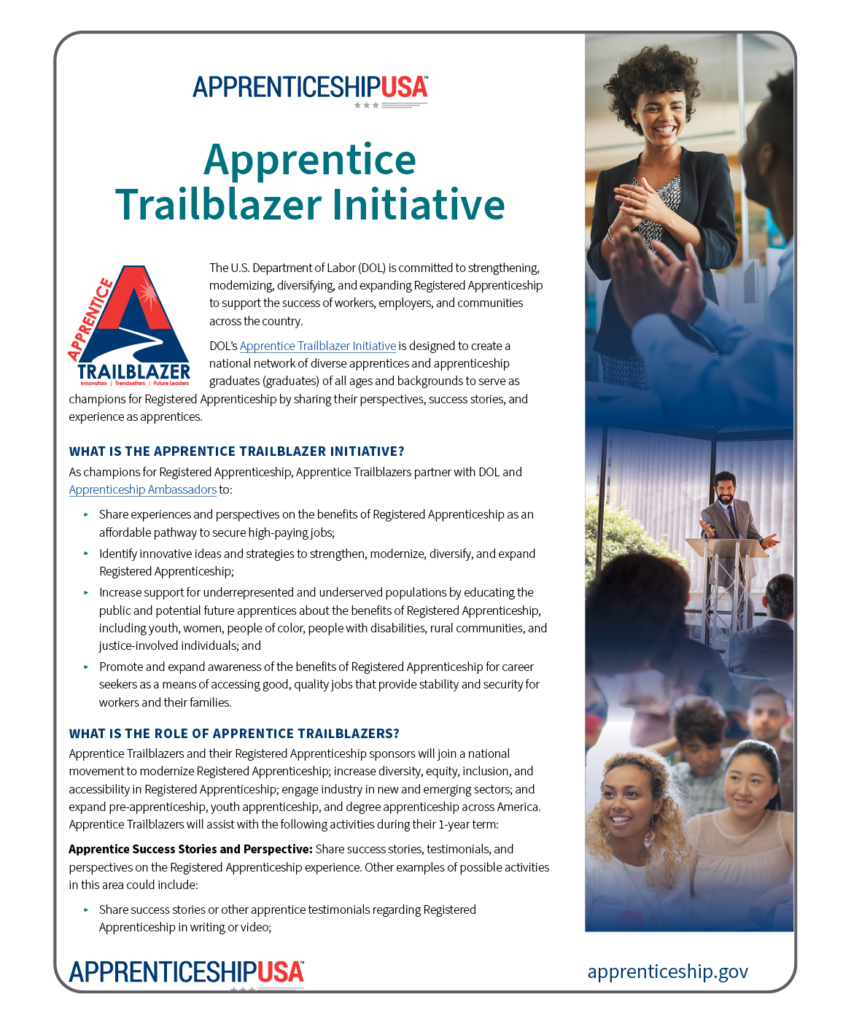
Apprentice Trailblazer Initiative
The Apprentice Trailblazer Initiative is designed to create a national network of apprentices and apprenticeship graduates to feature their stories and hear their perspectives, show how Registered Apprenticeships increase opportunities, and bring awareness to other career seekers who may be interested in becoming apprentices.
Department of Labor; ApprenticeshipUSA
TOPICS: Apprenticeship , Career Pathways , Community Engagement , Mentorship
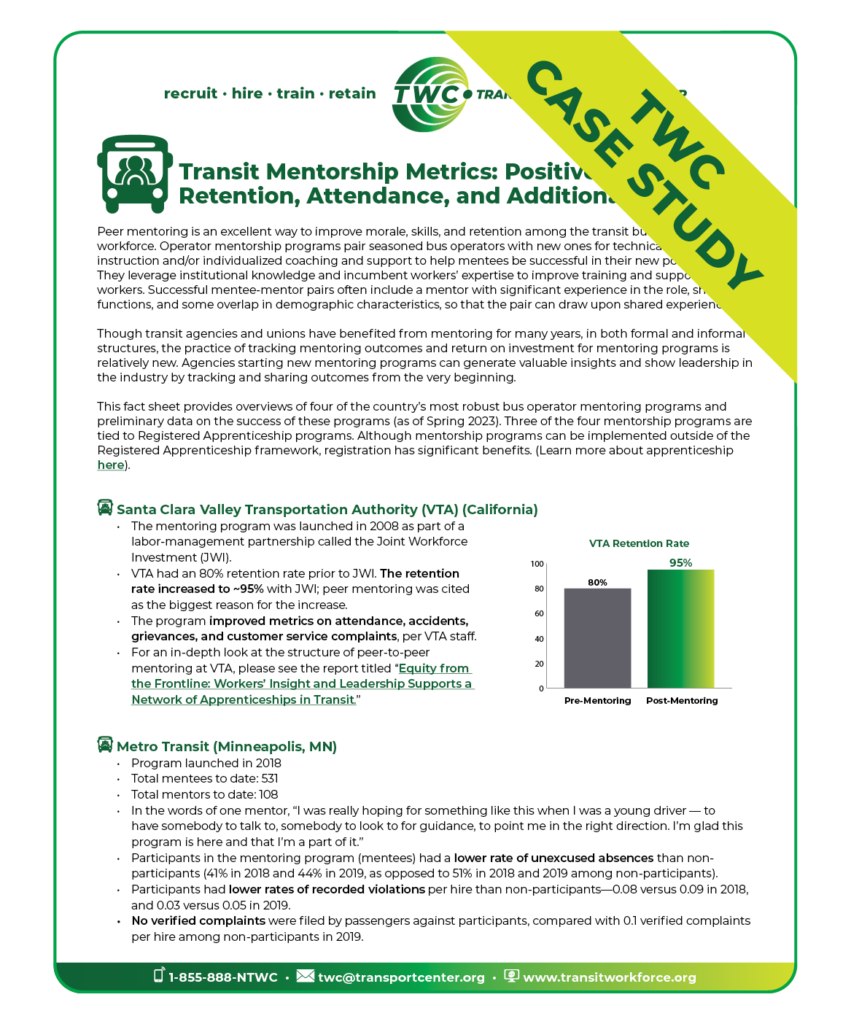
Transit Mentorship Metrics: Positive Signs for Retention, Attendance, and Additional Outcomes
Transit Workforce Center
June 2023
TOPICS: Apprenticeship , Mentorship , Policy and Planning , Retention , Training
This fact sheet provides overviews of four of the country’s most robust bus operator mentoring programs and preliminary data on the success of these programs (as of Spring 2023). Operator mentorship programs pair seasoned bus operators with new ones for technical skill instruction and/or individualized coaching and support to help mentees be successful in their new positions. They leverage institutional knowledge and incumbent workers’ expertise to improve training and support for new workers. The Mentoring Fact Sheet provides insight into the role mentorship programs can play in improving retention rates of workers, decrease unexcused absences, reduce rates of recorded violations, and lower complaints.
Contributing Authors: Shayna Gleason, Douglas Nevins, Michaela Boneva
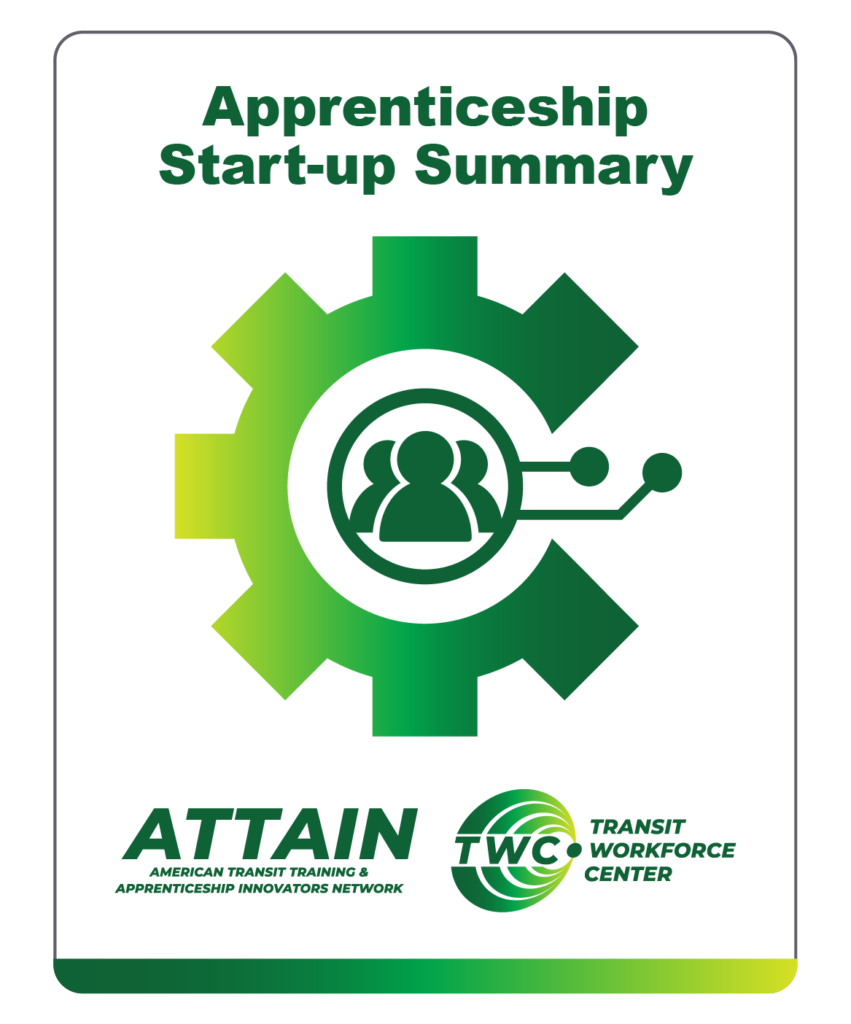
Apprenticeship Start-up Summary
These summaries outline the steps to tailor an effective Registered Apprenticeship (RA) program. These steps can be completed in order or, in some cases, concurrently. Apprenticeship programs are customizable to meet the employers’ skill requirements.
ProgressWorx
April 2023
TOPICS: Apprenticeship , Career Pathways , Labor-Management Partnerships , Mentorship , Training
If the workforce for the occupation to be registered as an apprenticeship is represented by a labor union, the employer and union would register the program as an Individual Joint program. If the workforce is not represented, the program would be registered as an Individual Non-Joint program by the employer.
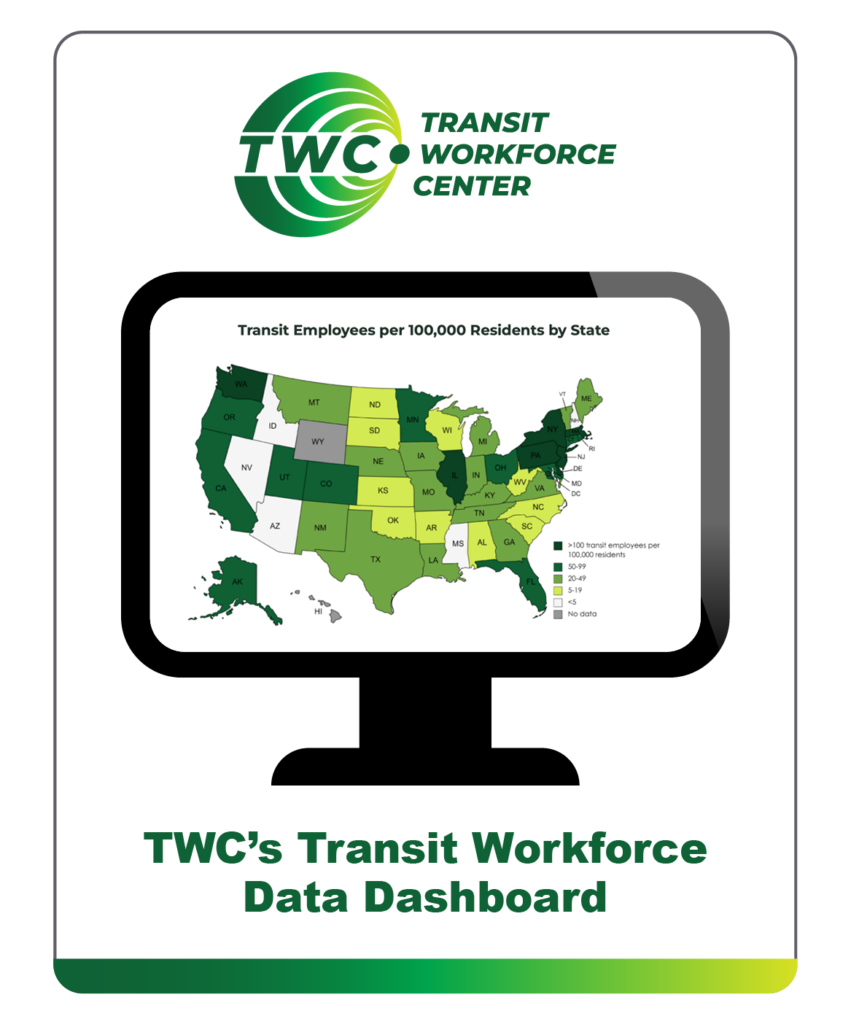
TWC’s Transit Workforce Data Dashboard
Launched in March, 2023, the Transit Workforce Data Dashboard presents quantitative, descriptive data about the composition of the transit workforce and trends in transit employment using a series of charts and graphics. This information is relevant for industry discussions in a range of contexts, including: strategic workforce planning in recruitment, retention, and other areas; examining and addressing opportunities and challenges related to workforce demographics; and identifying training and funding needs.
Transit Workforce Center
March 2023
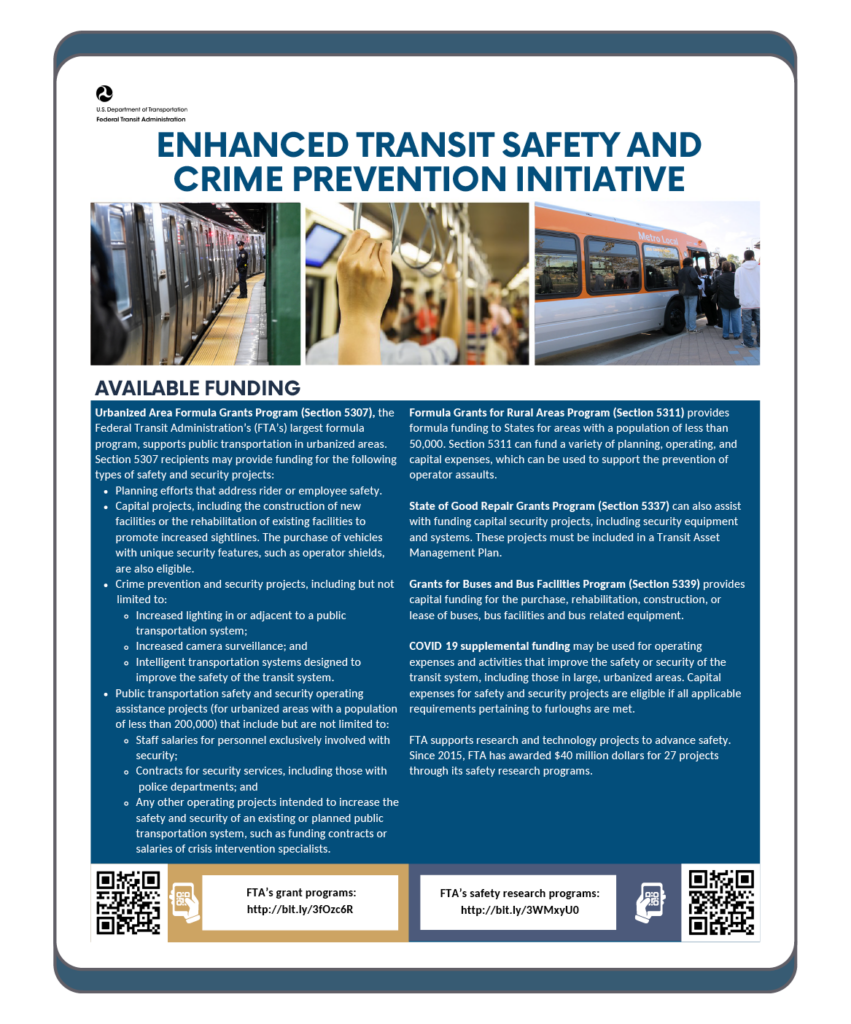
Enhanced Transit Safety and Crime Prevention Initiative FTA Funding Sources Factsheet
To help ensure the continued safety of our nation’s public transit systems, FTA launched the Enhanced Transit Safety and Crime Prevention Initiative to provide information and resources to help transit agencies address and prevent crime on their systems and protect transit workers and riders.
Federal Transit Administration
November 2022
TOPICS: Funding Opportunities , Safety and Health
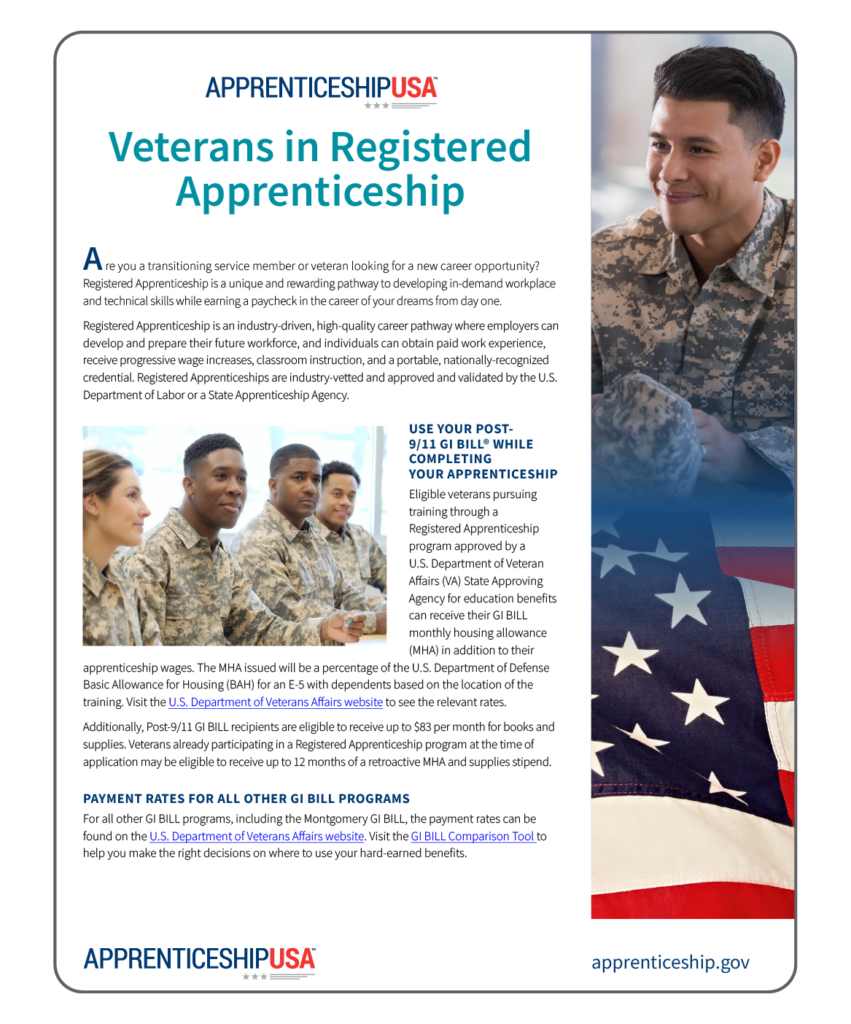
Veterans in Registered Apprenticeship
This fact sheet provides an overview of how veteran-specific public benefits can be applied to support a veteran’s completion of a registered apprenticeship program. It also provides links to resources for more detailed information on apprenticeship resources for service members, employment resources for veterans, and more.
ApprenticeshipUSA
August 2022
TOPICS: Apprenticeship , Community Engagement
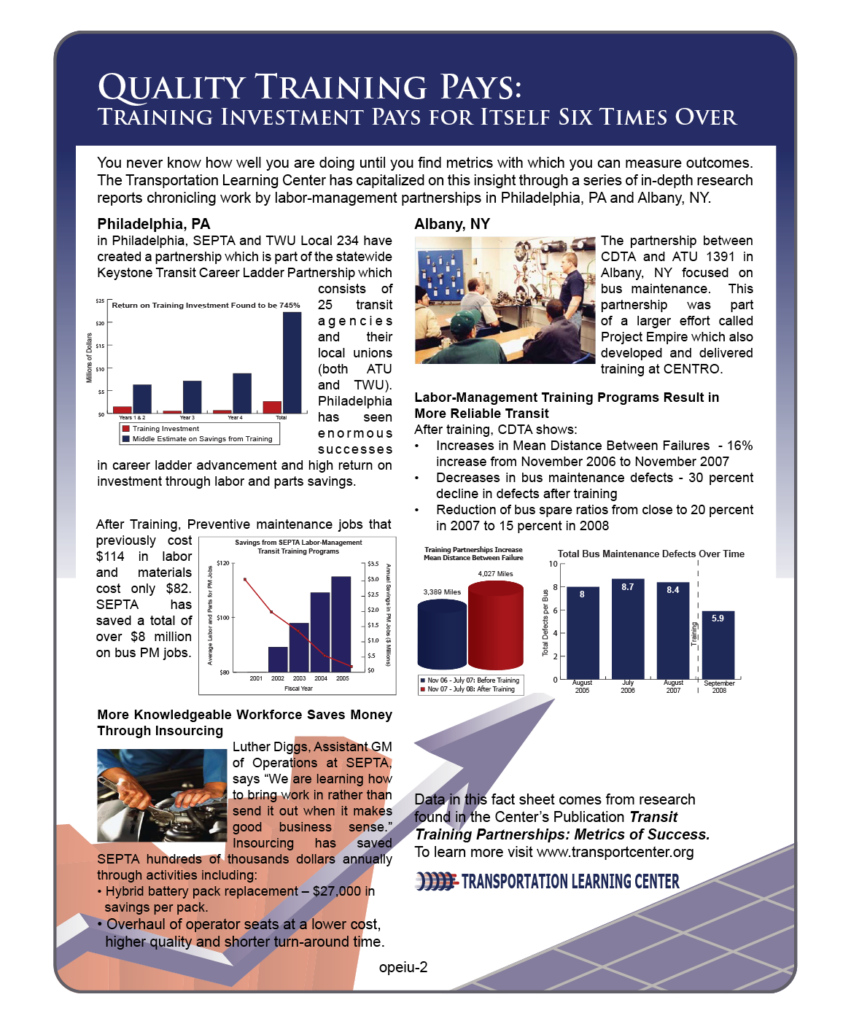
Quality Training Pays: Training Investment Pays for Itself Six Times Over
You never know how well you are doing until you find metrics with which you can measure outcomes. The Transportation Learning Center has capitalized on this insight through a series of in-depth research reports chronicling work by labor-management partnerships in Philadelphia, PA and Albany, NY. This fact sheet outlines these findings and shows a substantial return on training investment.
International Transportation Learning Center
June 2011
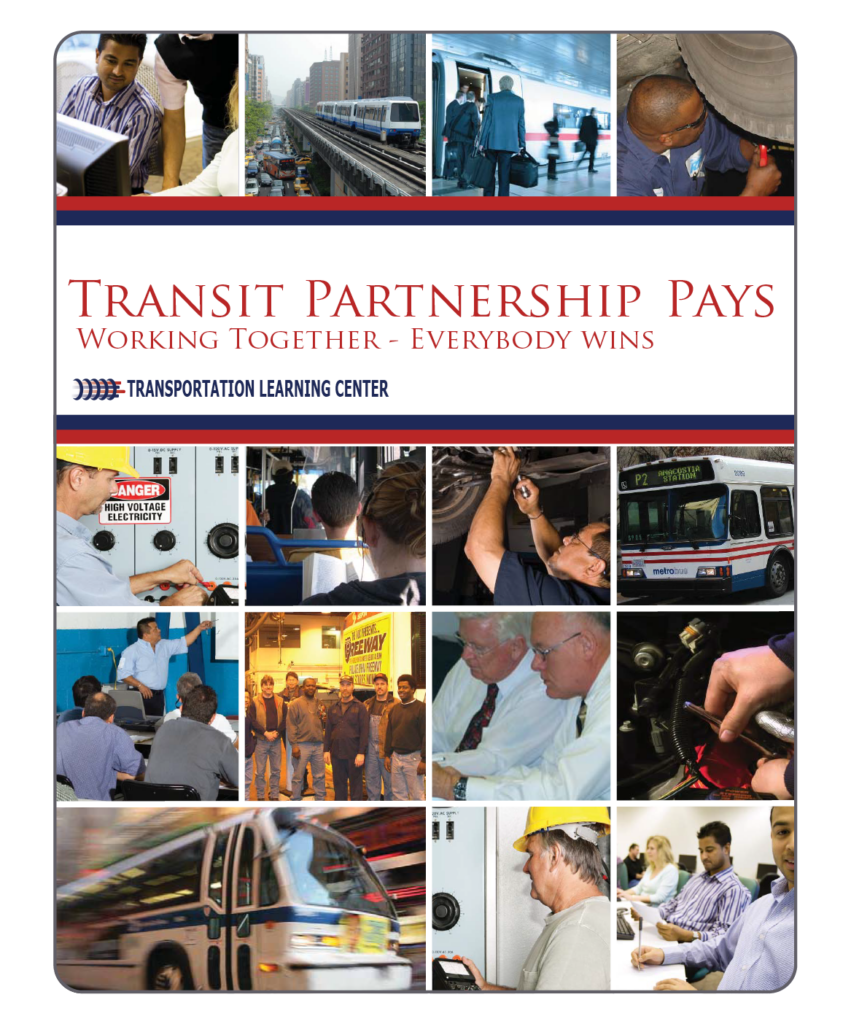
Transit Partnership Pays: Working Together – Everybody Wins
This report highlights the evidence that the most successful, cost efficient and durable training systems come from industry based labor-management partnerships.
International Transportation Learning Center
September 2009
TOPICS: Apprenticeship , Labor-Management Partnerships
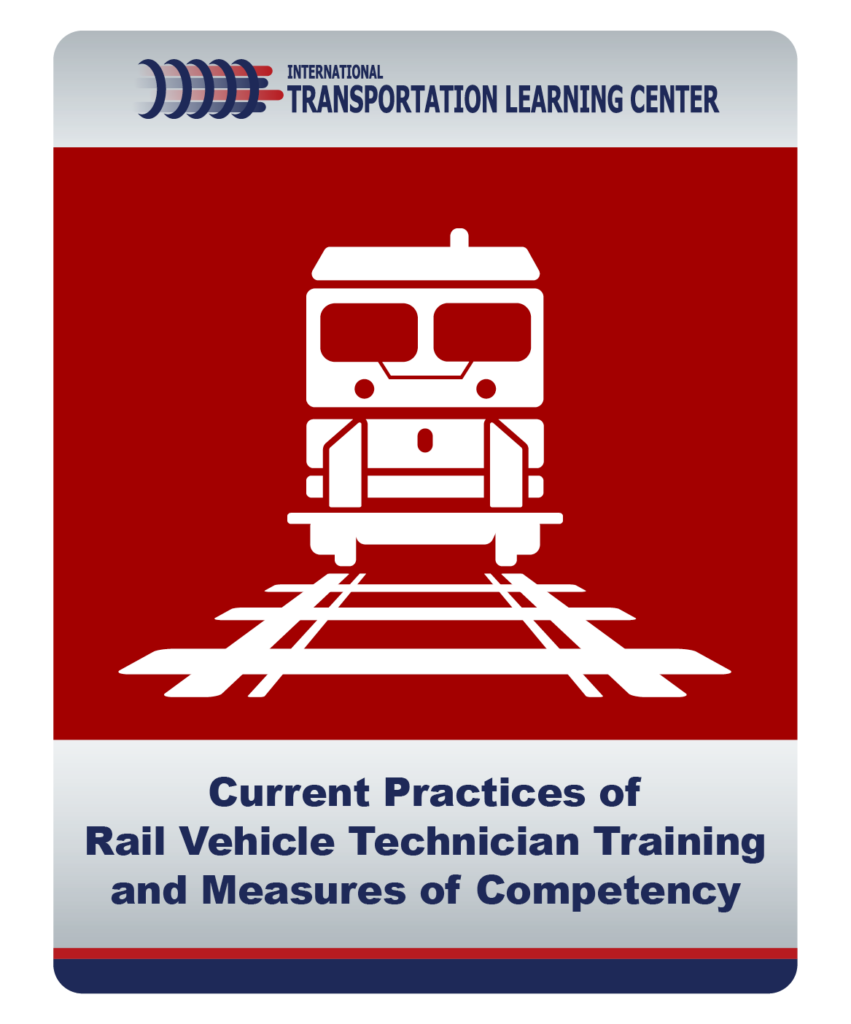
Current Practices of Rail Vehicle Technician Training and Measures of Competency
This 2009 ILTC brief summarizes findings from a survey on best practices in rail car maintenance, based on recommendations from the RCRP E-7 Panel.
International Transportation Learning Center
January 2009
TOPICS: Policy and Planning , Training








